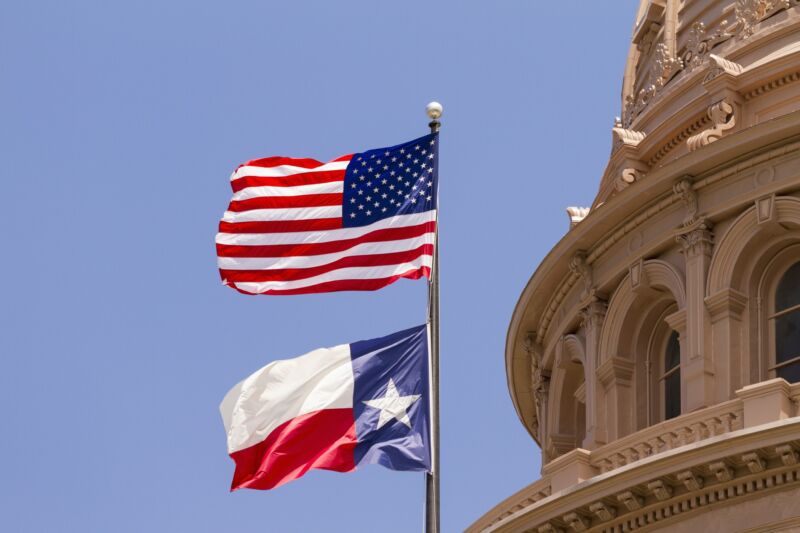Texas social media law will cause “chaos” online, Supreme Court is told
4 min read
Getty Photos | PA Thompson
Much more than two dozen teams have urged the US Supreme Court to block a Texas regulation that prohibits big social media firms from moderating material based on a user’s “viewpoint.”
The Texas legislation, HB20, “results in blatant violations of the To start with Amendment rights of system providers,” reported a Supreme Courtroom temporary filed yesterday. The regulation using impact indicates that “chaos will ensue online with disastrous and irreparable outcomes,” the brief said, continuing:
With platforms unable to correctly moderate scammers, messages preying on susceptible populations, including the aged, will proliferate on the net. The uptick of this articles will predictably end result in but far more people today currently being tricked into sending revenue to scammers or disclosing money info, foremost to id theft and economical spoil. Platforms will be powerless to regulate speech praising terrorists and people who engage in murderous campaigns, with horrendous potential ramifications if even a one person engages in copycat activity. And they may possibly be precluded from defending small children from age-inappropriate articles, together with reprehensible messages encouraging our youth to have interaction in self-destructive activities.
The temporary was signed by 20 tech-marketplace and advocacy teams, which includes the Chamber of Development Anti-Defamation League Related Commerce Council Purchaser Technologies Association Motor Advocacy Loved ones On-line Security Institute HONR Network Inc. Info Technology & Innovation Foundation Interactive Advertising Bureau IP Justice LGBT Tech Institute Multicultural Media, Telecom and Online Council Nationwide Affiliation for the Improvement of Colored Men and women Countrywide Hispanic Media Coalition Our Vote Texas Computer software and Facts Sector Association Halt Baby Predators TechNet Texas Point out Conference of the NAACP and the Washington Middle for Technologies Coverage Inclusion.
Groups seek out “healthy on line environment”
These groups are “dedicated to guaranteeing that shoppers can take pleasure in a healthier on the web atmosphere wherever they can effectively and proficiently perform, engage in, discover, shop, hook up, and categorical by themselves without having harassment, disinformation, and incendiary information,” the temporary stated. For illustration, the “NAACP and Texas NAACP are keenly conscious that HB20 would power platforms to host material that advocates for the reduction and/or elimination of civil legal rights, encourages discrimination, and threatens the perfectly-being, education and learning, and financial stability of Black people today and all folks of colour.” The transient also notes that the Anti-Defamation League “has extended performed a leading function in raising consciousness about hate on the Internet and functioning with big business suppliers to address the problem it poses.”
The Electronic Frontier Basis joined with five other groups to protest the legislation in one more Supreme Courtroom transient filed Tuesday. What the Texas regulation defines as censorship are essentially “perfectly-set up tactics intended to provide users’ passions,” the EFF mentioned. “Customers are ideal served when they can decide on amid social media platforms with distinct editorial procedures. Whilst articles moderation at scale is hard to get right, it blocks articles that some people never want to see, like personalized abuse and harassment, hateful speech, advertising of suicide and self-hurt, and glorification of Nazi ideology.”
The EFF’s brief was joined by the Center for Democracy and Engineering, the Nationwide Coalition Towards Censorship, R Road Institute, the Wikimedia Basis, and the Woodhull Independence Basis.
Legislation was reinstated in one-sentence buy
The Texas legislation was reinstated final week by the US Courtroom of Appeals for the Fifth Circuit, which granted state Attorney Basic Ken Paxton’s motion to stay a preliminary injunction previously issued by Judge Robert Pitman at US District Court docket for the Western District of Texas. Pitman had dominated that the Texas legislation violates social networks’ To start with Modification appropriate to reasonable consumer-submitted content.
Big Tech groups NetChoice and the Computer system & Communications & Business Association (CCIA) appealed the Fifth Circuit ruling to the Supreme Court docket on Friday. Among the other matters, they pointed out that the Fifth Circuit judges simply issued a a single-sentence buy and did not reveal their motives for keeping the preliminary injunction.
The EFF transient claimed, “Texas has not manufactured a robust showing that it is probable to realize success on the merits. Each individual court that has considered the issue has observed that social media platforms have a First Modification suitable to edit and curate the written content they publish on their websites. As practiced by social media platforms—including the big platforms that HB20 regulates—content moderation is the exercising of editorial judgment.”
A US District Courtroom decide blocked a similar legislation in Florida in June 2021.






